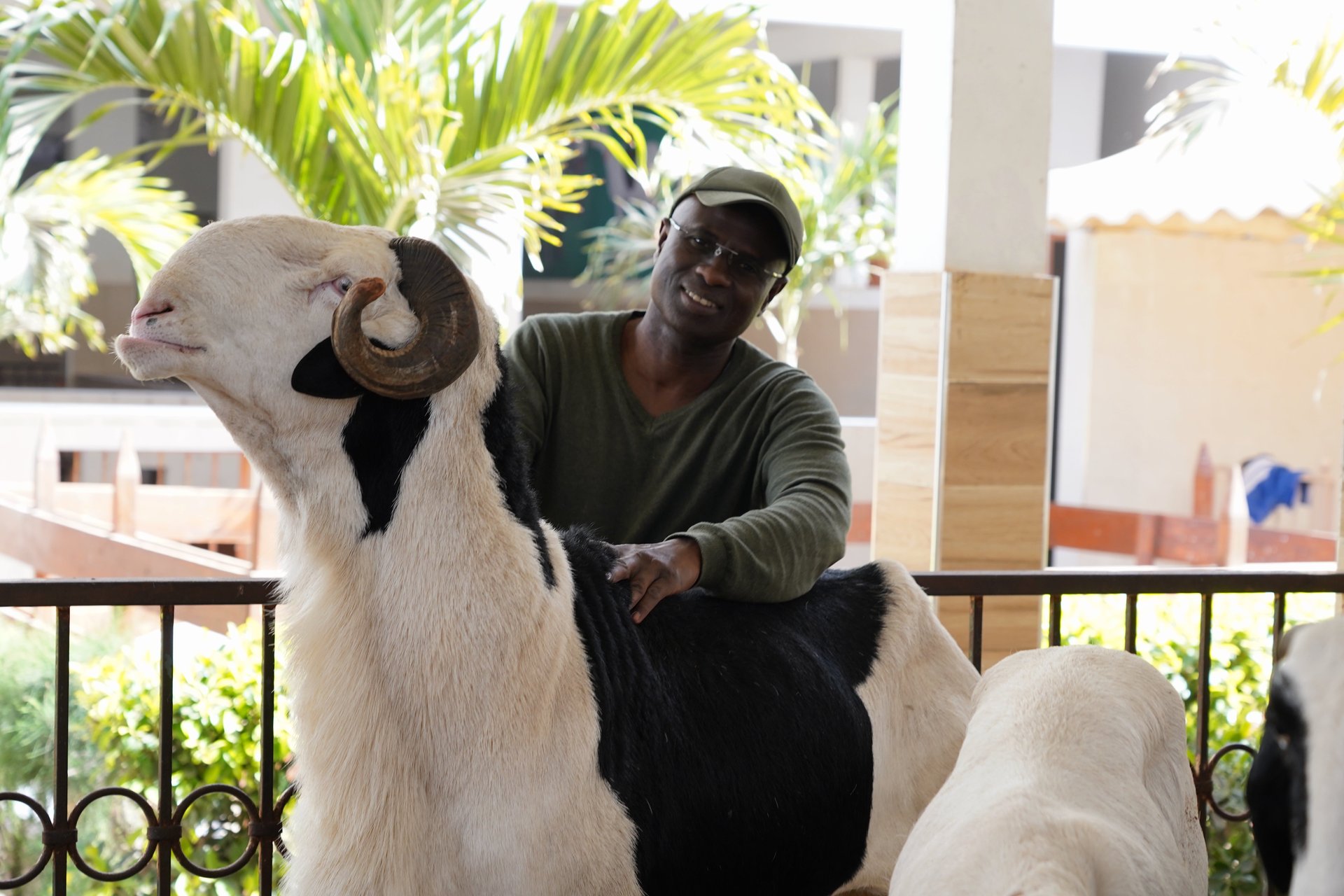Senegal’s ladoum sheep are the stars of Eid al-Adha/Tabaski celebrations
Lire en français

In the lead-up to Tabaski (Eid al-Adha) the soundscape of Dakar is increasingly punctuated by the bleating of sheep.
In Senegal it is customary to sacrifice these animals to mark important events such as weddings and births. But it isn’t until the religious festival, held in July this year, that the real mass slaughter takes place.
Some of the country’s wealthier families will pay for a Ladoum—a gargantuan hybrid of the Mauritanian Touabire and the Malian Bali-bali—first bred some 70 km outside the capital in the early 1970s. These beasts can weigh up to 385 lbs and the tallest are not far off human height.
“This is Joe Biden,” says breeder Abou Kane, proudly gesturing towards one of his prize specimens—a muscle-bound creature with perfectly symmetrical curly horns, a glint in his eyes and a fine black and white mottled coat. “I could sell him for about €20,000 [$21,000]”
An expensive ladoum like Joe Biden would typically be sold between farmers for breeding purposes—the bigger the ram, the larger the offspring. Smaller ladoums, more commonly sold for sacrifice, cost around $370.
Ladoums and Tabaski (Eid al-Adha)
“When we sacrifice something for God, we must sacrifice something we love,” says Kane.
“Above everything else in Senegal, we love beautiful beasts. The Ladoum is both big and beautiful. It is the rarity of this breed that makes it so expensive and profitable.”
As one of the top ladoum breeders in the country Kane is also the president of an organization called the Alliance for the Development and Improvement of Breeds. He has won dozens of prizes and is somewhat of a celebrity in Senegal.
Kane’s bergerie has more than 16,000 followers on Facebook and he is regularly invited on national television and radio stations. He is also a regular guest on Ladoum TV—a YouTube channel dedicated to the breed that has racked up close to 5 million views.
Ladoums are an unattainable treasure for most Senegalese
“People recognize me in the street. I can’t walk for five minutes in the town center without being stopped by someone, even when I wear my mask,” he said.
Among his famous clients are the NBA basketball player Gorgui Dieng and Yékini—the greatest Senegalese wrestler of all time. Neither of them sacrificed their rams instead opting to start flocks of their own.
But for many Senegalese, Ladoums are prohibitively expensive.
“Owning a Ladoum differentiates you from other people,” said Fatou Sen who has worked as a chef for 32 years. She has cooked ladoums a handful of times but never eaten one herself.
“When my children see someone with a big sheep, they know that this is a very important person. Ladoums are for the stars, not ordinary people.”
The minimum wage in Senegal is $921 per month but around 70% of the country works in the informal sector, earning significantly less.
War in Ukraine and sanctions against Mali
During Tabaski, many poorer Muslim families struggle even to buy a regular sheep along with the standard accompaniments of rice, potatoes, onions, and tomatoes.
This year the situation is particularly dire. The war in Ukraine has driven up the price of fuel and of cereal crops typically used to feed sheep where green pastures are unavailable. Some farmers have even taken to supplementing their flock’s diet with cardboard.
The recently-lifted economic sanctions placed on Mali—traditionally Senegal’s most important trade partner—also posed a risk to supply.
“There will be a terrible shortage,” predicts Mady Diakhaby, secretary general of the Chamber of Commerce in Kédougou, which sits on the Senegal-Mali border. “A major proportion of our sheep come from Mali and now the borders are closed.”
This has had a knock-on effect on sheep prices with even the scrawniest specimens now selling for a minimum of $130.
The Government has done what it can to prevent the costs spiraling further: scrapping import taxes for Mauritanian farmers and issuing one-off subsidies to Senegalese ones. It also issued grants worth a total of $69 million to more than 500,000 of the country’s poorest households in May.
But as far as Tabaski is concerned, the sense of solidarity within Senegalese society is perhaps even more important when it comes to ensuring that as many people as possible can celebrate the occasion. It is common for wealthier households to share their sheep with the less well-off.
“I would love to buy a ladoum for my children. But I think that if I had the money, I would buy lots of smaller sheep to share with my friends instead,” said Sen.